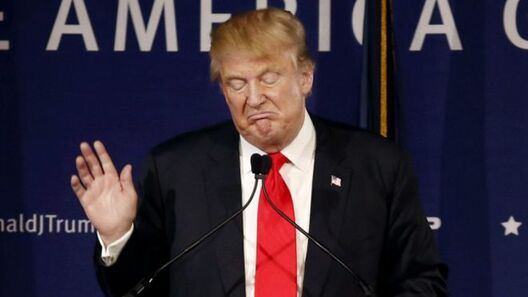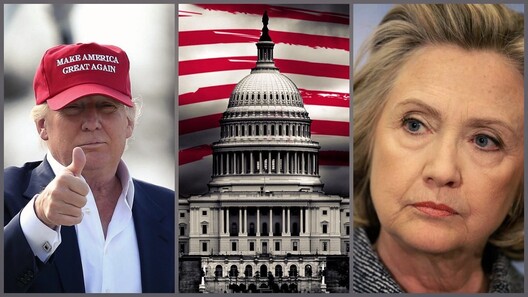Trump and the New Political Barbarism
What is happening in America’s presidential election this year is unprecedented. The Democrats and the Republicans have seen surprising successes by outsider candidates, Donald Trump and Bernie Sanders, who were both universally viewed earlier as having no chance to emerge as seriously competitive candidates.

Although it’s now clear that Bernie Sanders will not be the Democratic nominee this fall, in a way the real story on the Democratic side is his relative success, not the inevitability of the Clinton machine. It has been a century since the United States has seen an openly socialist candidate run for national office. And on the Republican side, never before has an extremist demagogue like Trump, with no ordinary conservative credentials at all, come so close to capturing the nomination to run for the Presidency.
Why is this happening now in both major American political parties?
One way to think of this is that American politics have finally come to more closely resemble Europe’s, although we have to make allowances for cultural and historical differences. This is because both Europe and America have entered a new and troubled phase in their social condition after more than a half-century of relative stability, prosperity, and security.
Powerful macro-economic trends, mainly the combination of deindustrialization and globalization, have disrupted the lives of millions of people and brought about permanent alterations to social structures around the world, including Europe and America. Large and persistent unemployment, and the enormous concentration of wealth into the hands of a very small minority are just two of the most obvious manifestations of this. On both sides of the Atlantic, this has resulted in a deepening and unyielding sense of social decline and political frustration for many ordinary people.
In addition to these structural socioeconomic challenges, the US and EU have also been stressed by external security challenges from the east and the south. For Europe this takes the form of an authoritarian and revanchist Russia, and waves of desperate and often undocumented Muslim refugees fleeing bloody conflicts. For America, it is mainly about a bold economic and military challenge from a rapidly rising China, and at least the perception (if not always the reality) of huge numbers of undocumented Mexican immigrants crossing their northern border. A key difference in the American case, by the way, is that both China and illegal immigrants are directly blamed for economic problems inside the US.
in BelarusianЗША: ці пераможа палітычнае варварства?
All of this has unsettled social understandings in America and Europe that had supported long-standing conventional political arrangements. Unable to address or even fully comprehend the seriousness of these permanent economic problems, traditional parties representative of a stagnant political class find their mass support steadily evaporating. This creates an opening for unconventional, even extreme candidates, right or left, who find that they now have a wider appeal than anyone would have thought possible just recently.

This is why Sanders and Trump do not really resemble any other American politicians, now or in the recent past. Sanders is proudly a “democratic socialist” which is of course a very conventional and mainstream part of the European political spectrum, but which in America is something genuinely shocking and has not been seen since Eugene V. Debs ran as a socialist a hundred years ago. Trump also resembles certain European political figures far more than any American examples. He is the American branch of a European family tree that includes Berlusconi, Orban, Le Pen, and Erdogan (interestingly, Trump and the Turkish leader share an equally thin skin and propensity to use the law to shield their fragile egos). Like his European cousins, Trump traffics in the fears shared by millions of ordinary people to advance his political goals. His vow to “make America great again” is designed to appeal the country’s worst instincts.

Like all populist demagogues, Trump offers simple explanations (“China cheats on trade deals”) and simplistic solutions (“we’ll build a Wall”) for complicated challenges. He expresses loathing for Muslims and Mexicans, and targets them both as scary, dark-skinned threats emanating from desert lands. He uses Twitter as a “dog whistle” (silent to normal humans, but heard clearly by his supporters) to send out coded extremist messages to generate political energy from irrational hatreds, including racism. Typical of these is the repeated call to “take our country back”; the unspoken part of that message is that it needs to be taken back because the country was supposedly “stolen” by a Black “Muslim” President who was “born in Kenya”.
In this, and many other ways, Trump cleverly exploits the frustration of poor whites feel toward “the system” by encouraging them to direct their anger at Blacks, Mexicans, foreigners, politicians, intellectuals, and other assorted “enemies” as the source of the country’s problems.
Statistically, the poorer and less-educated you are, the more likely you are to be a Trump supporter. Many critics of Trump are baffled by this billionaire’s popularity among such people, but that is exactly his appeal. In this trashy uncultured loudmouth they see someone like themselves, and in his cheap, empty financial success they see hope for themselves and even for the country. They see a clever businessman who knows how to fix the economy, even though all Trump has ever done is buy and sell real estate and go bankrupt four times.
Even more darkly, Trump exults in violent language, and urges violence by his supporters. He voices admiration for strongmen like Putin, and doubles down on the now standard American political use of the everlasting War on Terror to instill fear and paranoia that can be turned to his own political ends. But he goes far beyond even the most hardline of hard-liners, promising to use “real” torture methods that are “much, much worse” than waterboarding, and to carry out revenge executions of the innocent family members of known terrorists. These are shameless promises to commit war crimes, pure and simple.
And this quasi-fascist political message, this emerging cult of violence, is greeted with the enthusiastic cheers of millions ordinary Americans. Sadly, authoritarianism is often popular.
In Europe, a leader of this type would create his own political party to attract and organize followers. But the United States lacks a parliamentary multi-party system and never in modern history has a “third party” alternative to the Republicans and Democrats been able to gather more than very slight support in national elections. Instead, outsider candidates work within the two parties, but what is different about this election cycle is that Sanders and even more Trump benefited from widespread voter anger, and the appeal of unconventional voices from the left and the right. However, these outsider challenges are playing out very differently in the two parties.
The Democratic Party is still reasonably functional and is led by another Clinton – the familiar face of a family political dynasty with deep and influential roots in the party. She has not lost her grip; that is why Sanders, although he appeals to students and other members of the chattering classes, and despite performing surprisingly well in the contest with Hillary, will not succeed in his bid for the nomination. But his message still resonates widely and sympathetically within the Democratic Party. It is Sanders’ ideas, rather than his person, that may yet prove to have an enduring influence in the elections this fall and beyond.
Trump on the other hand has no network within the Republican Party, nor does he have any traditional Republican credentials. He not particularly conservative, and in the past has frequently and loudly taken liberal positions on various issues – which should be a huge weakness for his campaign among Republicans, but weirdly is not. This is because his populist message and clever manipulation of the media to build mass support don’t need conventional political techniques or organizational machinery.
Trump successfully scattered a weak field of Republican opponents who represented the chronic disarray and fragmentation of a party that has long relied on a political coalition that has never been coherent: hyper-religiosity in social affairs, faith in economic laissez-faire, and a militarized foreign policy. This combination has worked remarkably well in the past, but it also depended on ignoring very deep contradictory impulses among its three elements. Ironically it is exactly his lack of any core principles that allows Trump to transcend these three pillars of Republicanism, while he relies on his brutal populist charm to secure Republican votes anyway.
So now this barbarian chieftain Trump has marched his angry, unwashed army of followers to a gates of weakened Republican Party, a flawed and vulnerable fortress which at present shows every sign of failing to withstand his attack. The throne is his for the taking. At this point, only two potential obstacles stand now between Donald Trump and the leadership of the most powerful nation on earth.
The first is the Republican Party convention in June, where there is still a possibility of party leaders using a combination of the rulebook and secret deals to overturn a Trump candidacy. Trump has already threatened “riots” if this happens, but such violent unrest may seem like the lesser evil to Republican leaders contemplating the destruction of their party if Trump succeeds. But in fact, no one has any idea how this convention struggle may turn out.

The second is Hillary Clinton and the Democrats in the November general election. The conventional wisdom is that Trump will be easily defeated by Clinton, but this may dangerously overestimate her appeal as a candidate. Clinton’s style is robotic, bloodless and cerebral; she famously has a ten-point plan as a response to any question you care to ask her and has always had difficulty connecting with ordinary people. Trump’s style by contrast is visceral and emotional; he is messy and incoherent like a loud drunk at party, but he seems like a “regular guy” to many people. His offer of easy answers to all problems, and his assignment of blame to clear-cut enemies, appeals emotionally to a lot of angry and frightened Americans.
So, we can hope that the conventional wisdom is correct, and that we will swear in a newly-elected Hillary Clinton as President in January 2017. But we should also remember that the history of the twentieth century is littered with the bones of those who failed to foresee the triumph, however unlikely, of political barbarism over more civilized aspirations.

Peter Kracht is the Director of the University of Pittsburgh Press, with a distinguished book publishing career including editorial and executive roles at Oxford University Press, Westview Press, Harper Collins, and Praeger Publishers. He has an undergraduate degree from the University of Massachusetts in Russian and East European history, and pursued graduate studies at Columbia University in Soviet politics, international security, and foreign policy.